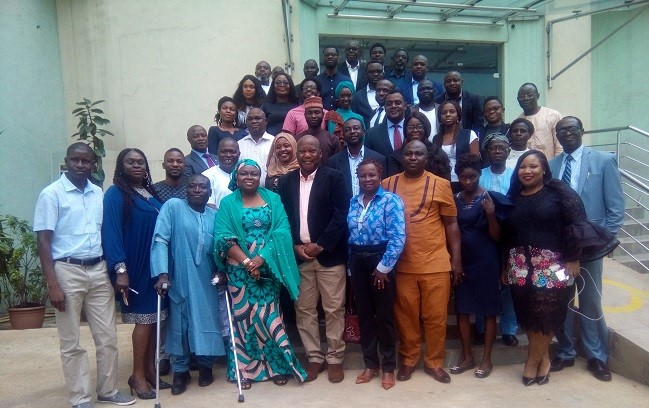In 2015, Nigeria submitted its commitment to tackling climate change at the United Nations Framework Convention on Climate Change (UNFCCC) COP21 in Paris, France with the submission of the country’s Nationally Determined Contribution (NDC) that sets out its intended contributions and strategies on climate action from 2015 to 2030.

The subsequent signing and ratification of the Paris Agreement further reinforces the country’s commitment towards the global quest to greenhouse gas (GHG) emission reduction that complement the several domestic efforts to address climate change.
Sequel to the commitment, Nigeria got a helping hand from the United Nations Development Programme (UNDP) NDC Support Programme to advance the implementation of its NDC.
As one of UNDP’s flagship schemes, the NDC Support Programme helps countries integrate climate and development solutions through the implementation of the Paris Agreement on Climate Change. The programme was launched in 2017 by UNDP, together with the European Union and the Governments of Germany and Spain.
The NDC Support Programme in Nigeria focuses its intervention on four axes, which are:
- Developing a financial strategy for funding the country’s NDC Sector Action Plan;
- Increasing private sector involvement in meeting the country’s NDC targets either by participating in mitigation and adaptation projects or by adopting climate-friendly measures in their current operations;
- Establishing a registry of adaptation and mitigation actions that are contributing to the achievement of NDC targets in order to start measuring progress; and
- Increasing the visibility of the NDC through an effective communication strategy and a full integration in the SDG and the next ERGP.
One of the planned activities under the increasing private sector participation component of the Support Programme is the hosting of six regional NDC Business Roundtables across the country to communicate the NDC targets and facilitate enhanced organised private sector involvement in the process.
The flagship edition of these regional forums, the South-West Regional NDC Business Regional Roundtable for the Private Sector, held in Lagos from September 26 to 27, 2019.
The objectives of the two-day event are listed as:
- To enhance and strengthen better and broader stakeholder engagement with private sector in the implementation of the NDC at the states and local government levels;
- To use and leverage existing platforms of organised private sectors at the regional levels to communicate details of the nation’s NDC Sector Action Plan and potential investment opportunities for businesses;
- Encourage and increase participation of the private businesses in low carbon and climate- resilient elements in their operations.
- Identify and aggregate the likely challenges of businesses in the NDC process and agree on approaches to address the gaps/barriers; and
- Identify and understand the capacity building needs of the private sector at the regional levels and develop possible technical assistance.
In a presentation, Dr Peter Tarfa, Director, Department of Climate Change in the Federal Ministry of Environment, while shedding some light on the nation’s low-carbon pathway measures, disclosed that Nigeria has taken appreciable steps in the fight against climate change and has gotten the political will and commitment to implement proposed national projects.
He listed some of the measures to include:
- Development of Sectoral Action Plan for NDC implementation road map
- Execution of awareness and outreach programmes
- Collaboration with national experts on climate change, research centres, international organisations, private sector players, NGOs, etc
- Issuance of first and second National Green Bond while the third one is on the way
- Framework for legislation under preparation
- Capacity Building on MRV and GHG Inventory achieved on sector mapping.
- Establishment of Climate Change Desk Offices in the 36 states of the Federation
- Commencement of the implementation of the NDC with the support of UNDP
- Continued activity on development of National Communications under the UNFCCC
- Scaling up access to Global Climate Finance
- Preparation of the TNA under the UNFCCC
- NDC Review with inclusion of waste and water sectors on the way;
- Development of National Roadmap for implementing the Rulebook
While identifying market entry points for businesses in the five NDC focused sectors and tracking actions by the private sectors, Dr Eugene Itua, CEO of Natural Eco Capital, stated that the range of opportunities are overwhelming, so a focused approach should be taken to ensure companies receive recommendations relevant to their motivations and sector.
He, therefore, underlined the need for:
- Clear guidance on the range of business opportunities available to contributing to meeting the NDC
- Business-applicable indicators to highlight private sector opportunities to contribute to the NDC
- Approved indicators incorporated into a digital tool customised for a quick assessment of the NDC opportunities most relevant to each business.
National Coordinator of the Nigeria UNDP NDC Support Programme, Mr. Huzi Mshelia, disclosed that the successful implementation of the NDC is dependent on a robust financing system that ensures adequate and timely funding of the identified priority projects, including a sustained inflow of investments from diverse sources.
He identified the Roadmap for the implementation of the NDC advocates for the development of a Finance Strategy and Plan as an approach to: raising resources, intermediating resources, and disbursing resources.
He said: “The NDC Sectoral Action Plan document also recognises that the financial estimates it provides are very high-level and would need further studies.
“To complement these two documents (the Roadmap and the Action Plan), it is therefore imperative to have an appropriate assessment of the full costs of the NDC Action Plan that also provides information on the possible investment sources, potential investors and timing.”
